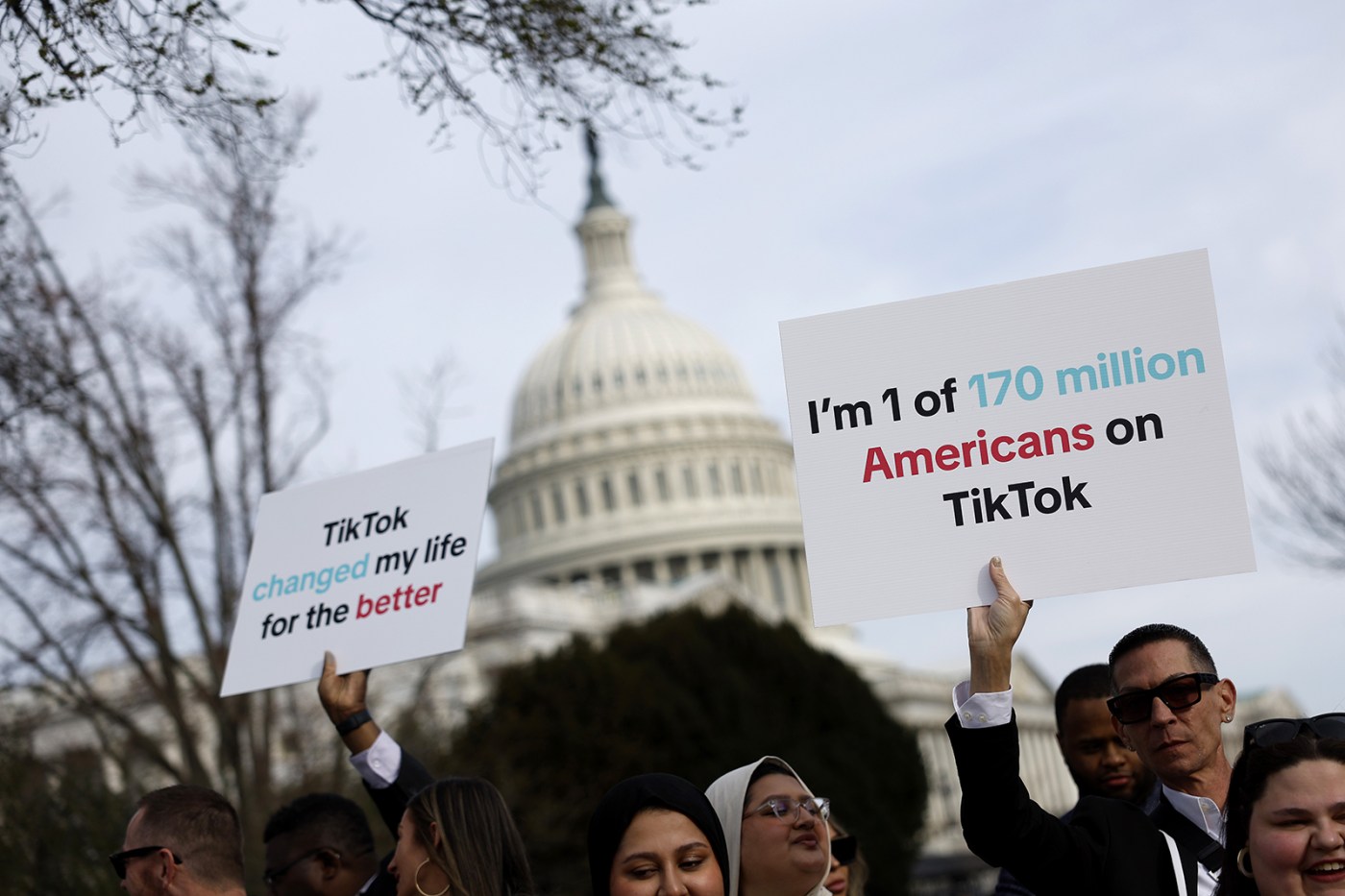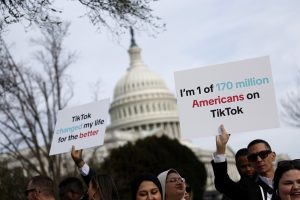
Supreme Court action on TikTok could shape congressional power
WASHINGTON — The Supreme Court hears oral arguments Friday in a case over the future of social media giant TikTok in the United States, a challenge that experts say also could affect the power of Congress to regulate social media.
The justices will have just nine days to decide what to do with the case before Jan. 19, when the federal law requires China-based Bytedance Ltd. sell the subsidiary running the American version of the app or face a ban. The Biden administration has defended the law, arguing that the Chinese government could access the data of U.S. users or influence what they see on the app.
The company, and its users, argue that Congress used unsupported fears of foreign influence to ban a social media platform used by more than 170 million Americans in violation of the First Amendment. They have argued for the justices to overturn a decision by the U.S. Court of Appeals for the District of Columbia Circuit last year upholding the law.
And President-elect Donald Trump also inserted himself in the tangle, arguing the Supreme Court should wait until after he becomes president on Jan. 20 so he can make a deal to address national security and free speech concerns.
Related Articles
Appeals court denies bid to block public release of special counsel’s report on Trump Jan. 6 probe
Vice President-elect JD Vance resigns from the Senate
New Hampshire Gov. Kelly Ayotte slams Massachusetts sanctuary policies, migrant crisis
Democratic Sen. John Fetterman to meet with Trump at Mar-a-Lago
As wildfires rage in Los Angeles, Trump doesn’t offer much sympathy. He’s casting blame.
Alan Rozenshtein, an associate professor at the University of Minnesota Law School, said he thinks the justices likely will uphold the law. In that outcome, he said the case would “not actually tell us a lot about social media regulation in general” because most policy discussions around social media regulation do not involve sensitive national security issues.
That outcome changes drastically if the justices overturn the law, though. “Now certainly if the court rules against Congress, that’s definitely going to tell us something quite dramatic about just how little power the government has to regulate social media companies,” Rozenshtein said.
“Because if the government can’t regulate a social media company given the profound national security threat in this case, when can it regulate a social media company?” Rozenshtein said.
Thomas Berry, director of the Robert A. Levy Center for Constitutional Studies at the Cato Institute, said the details of how the Supreme Court upholds the law could have its own consequences. The government has advanced two main worries about TikTok: the potential for misinformation spread at the behest of the Chinese government and that government’s access to Americans’ data.
Upholding the law on the misinformation concerns “would really open the door to much more policing of speech, more policing of social media by Congress,” Berry said.
“If you allow a social media site to be struck down because it has misinformation on it, it’s hard to know where you draw the line. It’s hard to imagine any social media site where you couldn’t find plenty of misinformation that could potentially justify Congress shutting it down,” Berry said.
The Supreme Court has restricted the federal government’s ability to regulate speech online in the past through cases such as Ashcroft v. ACLU in 2004, which threw out a federal law that prohibited the distribution of pornography to minors.
Last term, the Supreme Court also ruled that platforms have some First Amendment rights as part of decisions in a pair of cases over laws in Texas and Florida that regulated social media platforms.
Berry pointed out that the TikTok case is slightly different because it involves ownership rather than the activities of the sites themselves.
At least one justice has hinted at the same view. Justice Amy Coney Barrett, in a concurring opinion in the Texas and Florida cases, wrote that foreign ownership of a social media platform “might affect whether laws overriding those decisions trigger First Amendment scrutiny.”
The Biden administration and supporters have defended the TikTok law, arguing it’s the least restrictive way to address the dangers the platform poses to national security — even if there’s no evidence the Chinese government has caused any harm yet.
“Here, Congress and the Executive Branch determined that ByteDance’s ownership and control of TikTok pose an unacceptable threat to national security because that relationship could permit a foreign adversary government to collect intelligence on and manipulate the content received by TikTok’s American users, even if those harms had not yet materialized,” the Biden administration brief said.
In Supreme Court filings, the Biden administration has minimized free speech issues presented by the law and argued that they only arise if Bytedance doesn’t sell TikTok.
“The interest in preventing a foreign adversary from harvesting Americans’ sensitive data does not involve speech at all. And the interest in preventing covert content manipulation by a foreign adversary seeks to prevent all such manipulation regardless of the content or viewpoint being advanced,” the Biden administration brief said.
That was echoed by a Supreme Court brief from two of the main backers of the legislation in Congress: Rep. John R. Moolenaar, R-Mich., the chairman of a select panel on competition with China, and Raja Krishnamoorthi, D-Ill., the ranking member of that panel.
The lawmakers framed the law as a national security necessity rather than regulation of speech.
“Congress thus determined that the Divestiture Act is the least restrictive way to resolve the national security threat because nothing short of addressing TikTok’s foreign adversary control can address such risks,” the brief said.
Free speech concerns
TikTok and a group of its users have argued that the law amounts to a ban on speech the government doesn’t like and hearkens back to federal government censorship during the world wars and Red Scare, they argued in court filings.
The company argued in a brief that the law was effectively a ban because it would not be possible to sell the subsidiary by the deadline and selling it would fundamentally change the platform. The algorithm that drove TikTok’s success is owned by Bytedance and U.S. users would no longer have access to the posts of international users.
“Simply put, TikTok Inc. is a U.S. company exercising editorial discretion over a U.S. speech platform. The First Amendment fully protects it from Congress’s attempt to ban its operation of the platform based on its purported susceptibility to foreign influence,” the company’s brief said.
The company’s users argued the First Amendment was “sufficient during the First Red Scare and during the run-up to World War II. And it was sufficient during the anxious years of the Cold War. It is more than sufficient today.”
“The government’s asserted interest in preventing ‘content manipulation’ is constitutionally illegitimate, and its supposed data-security interest does not alone justify the Act’s suppression of speech,” the users’ brief said.
That argument had allies in Congress as a brief from Sens. Edward J. Markey, D-Mass., Rand Paul, R-Ky., and Rep. Ro Khanna, D-Calif., argued in a brief that the law relied on some of the same national security fears the courts have held were insufficient in the past.
“If our Nation’s experience with sedition laws during wartime and Red Scare has taught us anything, the latent possibility that the Chinese government could distort speech on TikTok cannot justify the preemptive measure of an overbroad and unprecedented ban of that speech outlet for all Americans — particularly when that ban could not prevent the Chinese government from manipulating content on other platforms,” the brief said.
Trump’s brief at the court, filed by John Sauer, his pick for solicitor general, argued that the law intrudes on his yet-to-begin executive authority over foreign relations and should be stayed.
Rozenshtein said it was notable that Trump would ask the Supreme Court to “stay” the law, because he is “asking the Supreme Court to do something that it has no legal authority to do.”
“I think they will ignore this brief because it’s silly, but it is a bad sign that Trump’s future solicitor general will write stuff like this,” Rozenshtein said.
The brief praises Trump’s “consummate dealmaking expertise” and argues for the justices to stay the law so that Trump can seek a “negotiated resolution” despite the federal law mandating the divestiture.
Berry said that Trump could spark a separate legal showdown if he follows through on the threat to stop enforcing the law because of his views on its constitutionality.
“We could see a real inter-branch conflict between our Congress and the presidency, between Article 1 and Article 2 of the Constitution, where Congress passed a law limiting the president’s discretion, and then you would have a president saying, ‘this has limited my discretion too much. I have an inherent authority to determine my foreign policy with respect to China,’” Berry said.
©2025 CQ-Roll Call, Inc., All Rights Reserved. Visit cqrollcall.com. Distributed by Tribune Content Agency, LLC.


